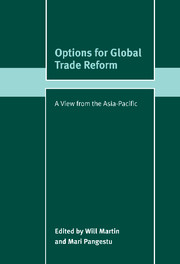Book contents
- Frontmatter
- Contents
- List of figures
- List of tables
- List of abbreviations and acronyms
- List of contributors
- 1 An overview: options for global trade reform – a view from the Asia-Pacific
- 2 Agriculture and the Doha Development Agenda
- 3 Liberalizing trade in manufactures
- 4 Returning textiles and clothing to GATT disciplines
- 5 Approaches to further liberalization of trade in services
- 6 Liberalization of air transport services
- 7 Liberalization of maritime transport services
- 8 International trade in telecoms services
- 9 East Asia and options for negotiations on investment
- 10 Competition policy, developing countries, and the World Trade Organization
- 11 The long and winding road to the Government Procurement Agreement: Korea's accession experience
- 12 Trade facilitation in the World Trade Organization: Singapore to Doha and beyond
- 13 Trade, the environment, and labor: text, institutions, and context
- Index
- References
10 - Competition policy, developing countries, and the World Trade Organization
Published online by Cambridge University Press: 22 September 2009
- Frontmatter
- Contents
- List of figures
- List of tables
- List of abbreviations and acronyms
- List of contributors
- 1 An overview: options for global trade reform – a view from the Asia-Pacific
- 2 Agriculture and the Doha Development Agenda
- 3 Liberalizing trade in manufactures
- 4 Returning textiles and clothing to GATT disciplines
- 5 Approaches to further liberalization of trade in services
- 6 Liberalization of air transport services
- 7 Liberalization of maritime transport services
- 8 International trade in telecoms services
- 9 East Asia and options for negotiations on investment
- 10 Competition policy, developing countries, and the World Trade Organization
- 11 The long and winding road to the Government Procurement Agreement: Korea's accession experience
- 12 Trade facilitation in the World Trade Organization: Singapore to Doha and beyond
- 13 Trade, the environment, and labor: text, institutions, and context
- Index
- References
Summary
Introduction
The complex, loosely defined area of competition policy is becoming more prominent on international agendas, at multilateral, regional, and bilateral levels. Most often it is perceived as one of the “new trade-related issues”, and yet it is neither new nor primarily trade-related. It is also open to very different interpretations, depending in part on a country's economic circumstances and in part on where countries or groups of countries wish to focus international discussions.
Competition policy is often treated as synonymous with competition law for dealing with anti-competitive private conduct in transnational markets. But the internationalization of competition issues will mean little unless national and transnational policies reflect a comprehensive approach to the promotion of competition, in the sense of creating the conditions and opportunities for merit-based competition and consumer benefit in all markets. Such a comprehensive approach does not, however, fit comfortably into the WTO's trade-driven and rules-based framework. There are difficulties relating to objectives, coverage, analytical setting, substantive provisions, and enforcement.
The interface between trade and competition was one of the “trade-related” issues that arose during the Uruguay Round negotiations, but nothing came of those discussions at that time. In the context of the GATT, the issue arose because of a concern that the gains to member countries from trade liberalization might be reduced or nullified if anti-competitive conduct within national markets prevented market access.
- Type
- Chapter
- Information
- Options for Global Trade ReformA View from the Asia-Pacific, pp. 218 - 248Publisher: Cambridge University PressPrint publication year: 2003



